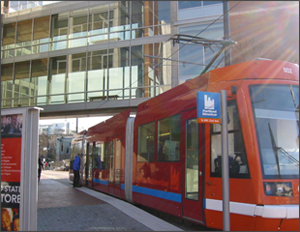Strategy of the Month: Sustainable CommunitiesOctober 2010 The Regulatory Barriers Clearinghouse (RBC) has added a new sustainable communities component to identify strategies that integrate affordable housing, energy efficiency, and transportation decisions at the planning and development levels. This new addition to the RBC website reinforces HUD's commitment to creating strong, sustainable, inclusive communities and quality, affordable homes for all. To HUD, sustainability means ensuring that the land that we build on is clean or will be clean; the investments we make in neighborhoods help residents lead healthy, safe, affordable, and productive lives; the buildings we invest in are energy efficient and healthy; and the regions we support improve their economic strength and provide opportunities for all residents. The newly created section, Affordable and Sustainable Housing Strategies, assembles the latest news, research, and other practical resources related to sustainable development, including:
In addition to the sustainable communities component, we have developed a new interactive Geographic Information System (GIS) search tool, making it easier than ever to locate affordable housing strategies by state, region, or locality. Click on the Barriers and Solutions map on the homepage for a listing of solutions to state and local regulatory barriers currently listed in the RBC database (Note: strategies, resources, and best practices originating at the national or federal level can all be found by clicking on the “Washington, DC” location on the interactive map). We hope this new resource will assist communities as they continue to look for ways to promote sustainable affordable housing development. If you require assistance in identifying additional policy tools, research, or strategies available through our searchable online Clearinghouse database, email us at rbcsumbit@huduser.gov, or call us at 1-800-245-2691 (option 4), or visit our website at www.regbarriers.org. Feel free to forward this message to friends and colleagues with an interest in sustainable communities. |

|
|
|
 A Highlights section featuring relevant articles on location- and energy-efficient housing from RBC's electronic newsletter,
A Highlights section featuring relevant articles on location- and energy-efficient housing from RBC's electronic newsletter, 
